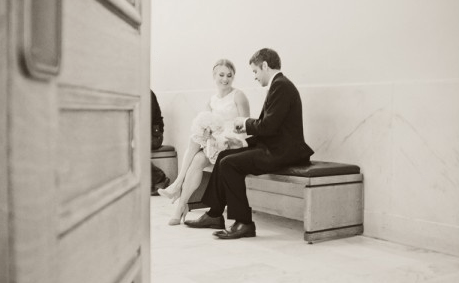Civil ceremony then married in the Catholic Church
I really need the help of wedding etiquette experts! I have read previous forums where the experts have all agreed that having a religious ceremony after a civil marriage is tacky and a bit of a sham. I tend to agree. Unexpectedly, I have found myself in the position to have both civil and religious ceremonies. I am not sure how I should handle the religious ceremony.
My fiance and I have been dating for two years and have only recently gotten engaged (about 6 weeks ago). We are both Catholic. As I am sure any wedding expert knows, there is a several month vetting process for marriage in the Catholic Church. My fiance and I are currently living in different states as he is military and has just received a new duty station. We planned to put in our “application” for marriage with the Diocese of the Military when I go to visit him in 8 days. He found out today that with his new duty, and with some potential international trouble brewing, he could be deployed in as little as 6 weeks with only 24 hour notice. We have already begun planning a Catholic wedding, including putting down some hefty deposits on church/reception venue, for this December. Given his unexpected potential deployment, my fiance wants us to go ahead and get married at a courthouse when I come to visit him next week. He fears that if he were injured while deployed, I could not make medical decisions on his behalf unless we were married and if he died (it pains me to even type), I could not receive his full military benefits unless we were married. He is very worried about this and I have agreed to have a civil ceremony when I go to visit (we would just get married in the Catholic Church, but we couldn’t get the marriage approved by next week.)
But now I don’t know what to do about the religious wedding. The Catholic Church does not recognize civil marriages, so in the eyes of the church, we would not really be married. But it feels weird to me to have a large wedding after we are already legally married. Marrying my fiance will be the happiest day of my life, I don’t know if I could keep the civil ceremony a secret. I am nervous to tell my family– I am the youngest child and only daughter in a family of 5 children. I am the youngest grandchild on both sides of my family; my fiance is the only son and the oldest grandchild on both sides of his family– a LOT of people are looking forward to this wedding. We already have over 30 people offering to plan 6 showers. I am finally understanding why people say that weddings are for the families, not the couple.
Advice is much appreciated!
Bride-to-Be-Erin
**The deployment should be short, less than 3 months, my fiance should be guranteed home for a wedding in December.
Donna, Wedding Queen, President
I certainly can see why you’re asking for help. This is a tough position. I do want to note that I don’t believe any of us would have said it was tacky to be married civilly and then have a religious wedding. I think the message is that it wouldn’t make sense, especially in the Catholic Church where, as you point out, they do not recognize a civil ceremony, yet they realize the couple has been living together as husband and wife – and so do all of your guests! The etiquette issue here is for the guests – knowing they aren’t really witnessing a wedding, but more of a church blessing of a marriage that’s already in place. So – a wife (already married woman) walking down the aisle in a formal wedding dress on the arm of her father (which is supposed to be symbolic of the bride leaving the care/responsibility of her parent to go to the groom) to greet her husband. Very, very confusing. :blink:
I’m not sure I have a perfect answer for you, one that allows you to make legal decisions and be a legal wife, while not really getting married so you can wait to have the church wedding. I think that’s what you’re asking about – correct me if I’m wrong. Are the groom’s parents unable to make these decisions on their son’s behalf? Would they allow you to be involved in those decisions? Perhaps all of this doesn’t have to be done legally if you can all agree before he is depolyed that you’ll make the decisions as a family.
I’d speak to your priest, get his guidance and pray about it together. In the meantime, if you were my daughter, I’d advise that you wait until the groom returns home to have the big white church wedding, which is what you really seem to want. Unfortunately, we sometimes have to make hard decisdions in life and most problems will not have the perfect answer.
Reader Response:
God bless you as you make your decision and thank you, and your groom, for the sacrifices you are about to make for our country and our freedom. Safe trip and return.
Donna, Wedding Queen, President
As an aside, 6 bridal showers is a little over the top. No family members, unless members of the bridal party, should be planning a shower. Hopefully the showers can be consolidated into 2 or even 3, tops. These showers should be fairly informal and not be a financial burden on the host or guests (so other than the bridal party and mothers, guests should be invited to only one shower)
Kay and Dennis Flowers Authors of Catholic Annulment
We agree with the wise counsel offered above. Waiting for the big wedding in December is best. So is trusting God for your fiance’s safety, health, and timely return.
His sweet concern for your care is admirable and totally understandable. If it is all right with his parents or next of kin, you could intervene on his behalf with a legal power-of-attorney. We’re not sure, but he could possibly secure you with his military benefits through a pre-nuptial agreement. Both of these acts require a lawyer skilled in military policy.
With prayers for his safe return and the wedding you’ve planned for, may God bless you and keep you.
Donna, Wedding Queen, President
Just for the record, the following is not legal advice and was obtained from my partner, who is an attorney.
“He fears that if he were injured while deployed, I could not make medical decisions on his behalf unless we were married”
DennyandKay are correct in that he could execute a POA (for financial matters) and a Health Care POA (for medical decisions) giving his fiance an agency to make decisions for him if he were unable to do so.
“and if he died (it pains me to even type), I could not receive his full military benefits unless we were married.”
A pre-nup would not do it. Unless he can designate a beneficiary and name the fiancé on, say, a life insurance benefit, there is no way he can provide her with most (if not all) VA benefits unless they are legally married. For example, The death gratuity amount ($100,000 for those who die in active duty) is made payable to survivors of the deceased in this order.
- The member’s lawful surviving spouse.
- If there is no spouse – to the child or children of the member, regardless of age or marital status, in equal shares.
- If none of the above – to the parents, or brothers and/or sisters, or any combination as designated by the deceased member.
- Natural father or mother.
- Father or mother through adoption, in equal shares.
- Natural brothers and sisters.
- Any person who acted as guardian for not less than one year at any time before the deceased member’s entry into active service.
- Brothers and sisters of half blood and those through adoption.
- Surviving parents, in equal shares.
- Surviving brothers and sisters, in equal shares.
The death gratuity is not paid to any other person when there are no survivors as listed above. I would think that any other benefits would be the same. Again, this is not legal advice. I would contact a local attorney to get the POA and discuss your options. Bottom line – if you’re young and able to work, and you have no dependents, benefits shouldn’t be an issue.
See Also


